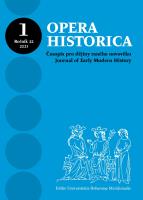Was early modern natural law secularized? The current debates
Was early modern natural law secularized? The current debates
Author(s): Ivo CermanSubject(s): History of Law, History of ideas, 16th Century, 17th Century, 18th Century, Philosophy of Law
Published by: Jihočeská univerzita v Českých Budějovicích
Keywords: secularisation; natural law; Erastianism; Grotius
Summary/Abstract: Even though the idea that there was a one-way secularization of natural law in 17th century has been abandoned, it is still possible to speak about an unintentional long-term secularization of legal thought. This is the position advanced recently by Knud Haakonssen. I argue here that this approach also requires a focus on specific classical works that had „secularizing effects“. The matter may be complicated by changes that a classical work underwent in re-editions during the author’s lifetime, or by reinterpretations of a classical work itself that may reveal previously unknown religious undertones. On the other hand, contextual or clandestine texts by the author should not be regarded as relevant, but merely as other religious interests displayed by the author during his lifetime. This review article surveys current valid secularization theories, and then focuses on the recent volume Sacred Polities, edited by Hans W. Blom (2022). It raises a new question about the parallel „Hebraist natural law“ which existed side by side with the post-Grotian „secular natural law“. Petrus Cunaeus’s De republica Hebraeorum of 1617, which coined the term „theocracy“, is especially important. The chapters on Humanist natural law before Grotius show that the Danish Lutheran Hemmingsen had used a deductive method long before Pufendorf and Wolff. Recent research on Catholic natural law has underlined that the Catholics made a significant contribution in their optimistic conception of rational human nature. This is partly reflected in Blom’s volume, which also explains why the Neapolitan school of natural law was interested in Grotius’s conception. Finally, the chapters on Pufendorf demarcate the limits of human agency vis-à-vis divine voluntarism, and then in terms of political coercion in matters of religion. New research has established that Pufendorf rejected coercion only in fundamental matters of revealed religion, but admitted the use of force in uncertain religious issues. It has also been proved that Pufendorf ’s natural law was not backed by God arbitrarily, but within the framework of a „hypothetical necessity“.
Journal: Opera Historica
- Issue Year: 24/2023
- Issue No: 1
- Page Range: 131-145
- Page Count: 15
- Language: English

